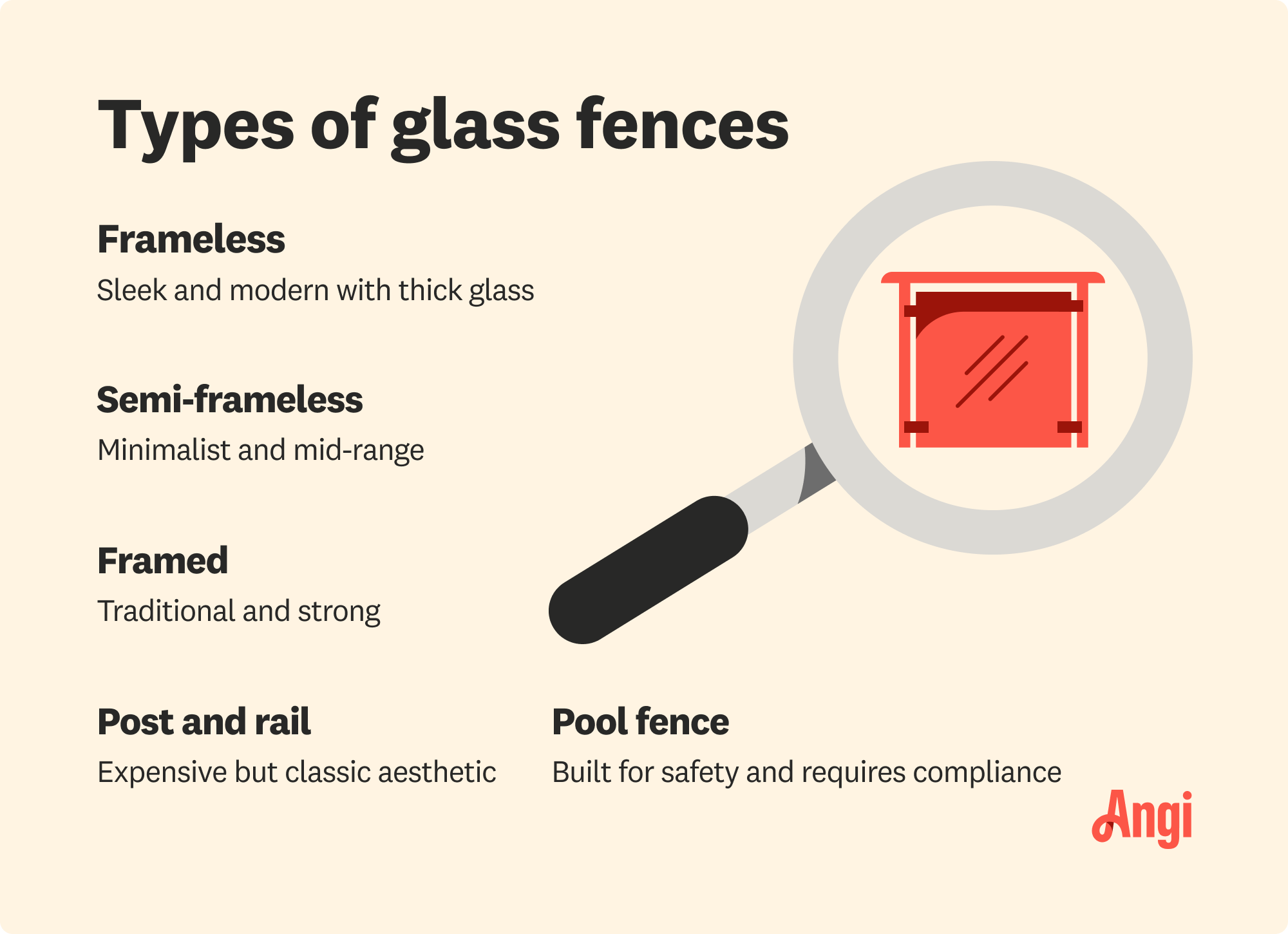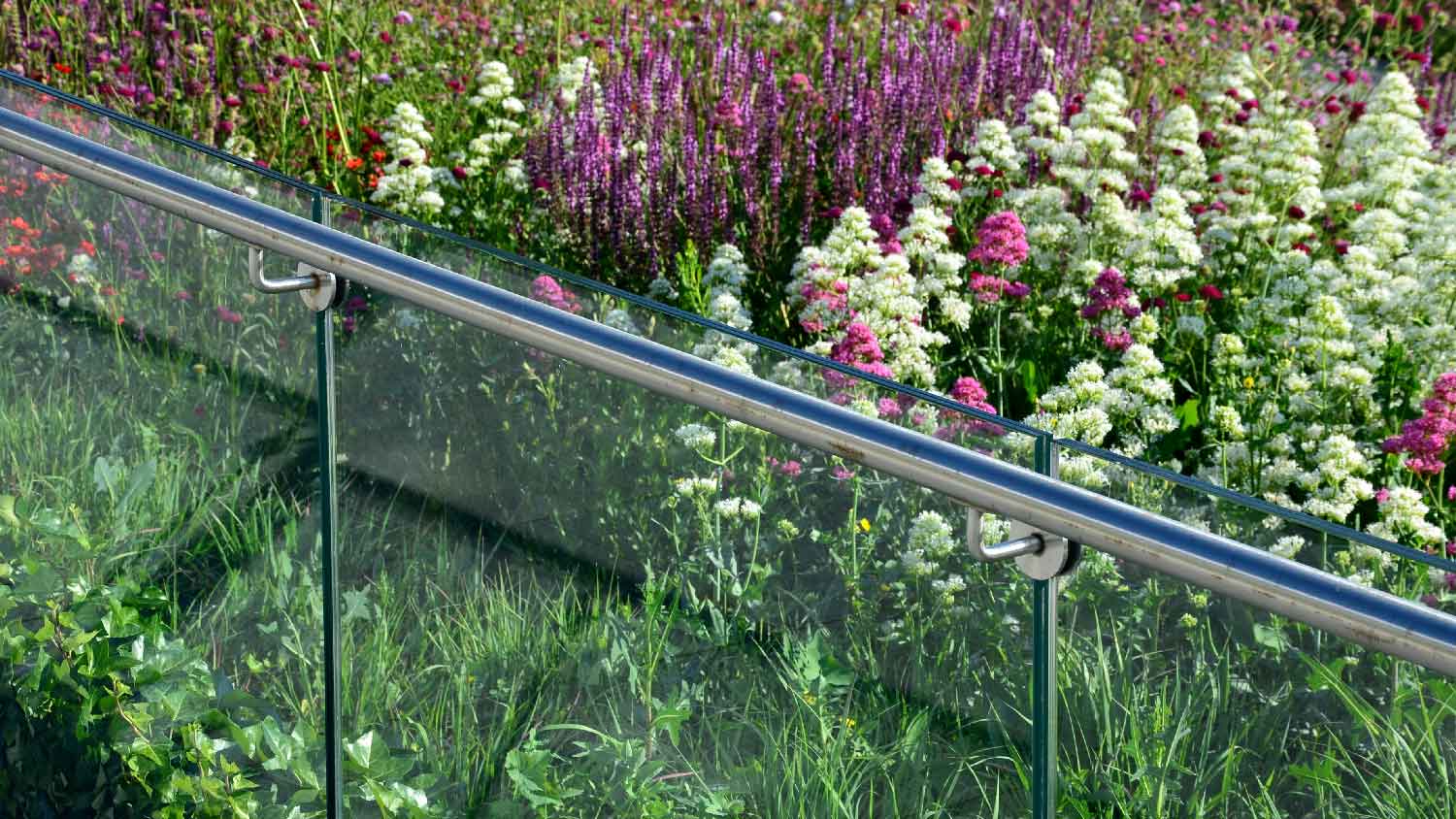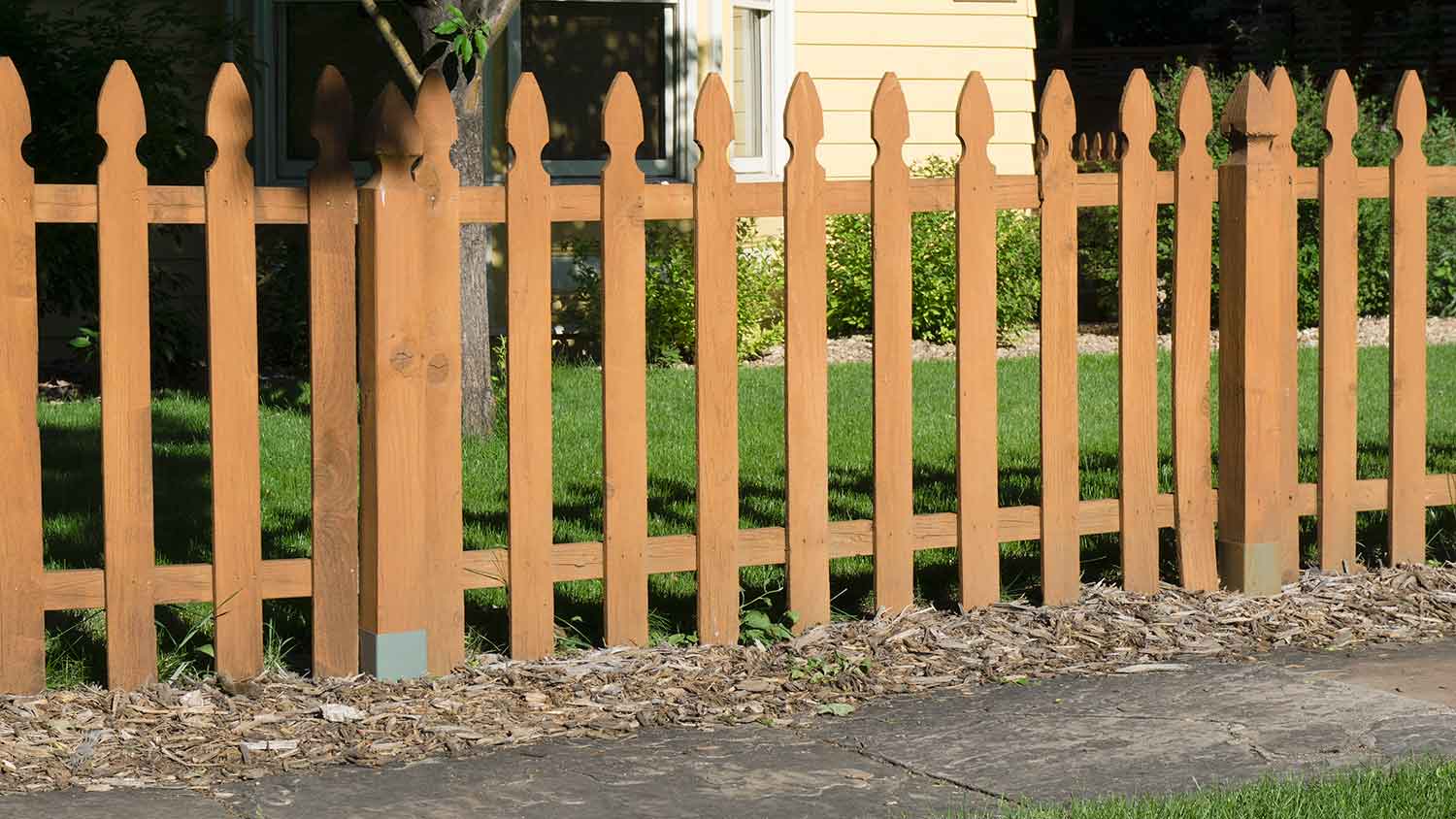How Much Does a Glass Fence Cost to Install? [2025 Data]
Installing a glass fence costs $12,000 on average, but ranges between $7,000 and $30,000, depending on the size and scope of the project.


Installing a glass fence costs about $12,000 depending on the fence size and the type of glass you choose. Labor is also a significant cost factor when you install a glass fence at your home. Glass fencing ranges from $70 to $225 per linear foot or between $7,000 and $30,000 on average. However, smaller glass fences are a more affordable option, while larger—and more elaborate—glass fences can cost much more.
Glass Fence Cost by Type

There are a few types of glass fence designs to consider, but the less frame around the glass, the more modern—and expensive—the fencing will be. Overall, most glass fences cost between $70 and $220 per linear foot.
The type of glass used for most fencing is called tempered glass, and it’s designed to be extra strong. On the off chance that it does break, tempered glass forms larger pieces than standard glass (which shatters into tiny, more dangerous shards). While not as common, laminated glass can be used for fencing. However, it isn't as strong as tempered glass.
There is one type of glass fence in its own category due to safety regulations: pool fencing. Pool fences need to be made of Grade A safety glass, which is a type of certified tempered glass that goes through rigorous testing. Pool fencing costs more than your average glass fence, though not as much as frameless glass fences, which require thick glass to account for the lack of framing, which would otherwise leave them more susceptible to breaking.
| Type of Glass Fences | Average cost (per linear foot) |
|---|---|
| Frameless | $110–$220 |
| Semi-frameless | $90–$180 |
| Framed | $70–$140 |
| Post and rail | $90–$170 |
| Pool fence | $90–$190 |
Glass Fence Cost by Size
The size of your fence greatly influences the final cost—more so than labor rates or fence design. Glass is expensive, and you may find suppliers are less willing to offer bulk discounts than they might if the fence was wood, metal, or another type of fence.
| Size (Linear Feet) | Framed Cost | Frameless Cost |
|---|---|---|
| 50 | $3,500–$7,000 | $5,500–$11,000 |
| 100 | $7,000–$14,000 | $11,000–$22,000 |
| 125 | $8,700–$17,400 | $13,700–$27,400 |
| 175 | $12,300–$24,600 | $19,300–$38,600 |
| 225 | $15,700–$31,400 | $24,700–$49,400 |
Many people looking to build a glass fence need one around their pool. Property developers involved in real estate transactions will commonly install fencing around pools as it makes the property more attractive for those with families or pets.
Standard in-ground pool sizes range from 10 feet by 20 feet to 20 feet by 40 feet. Expect to pay on the higher end of the table above to surround your pool with glass fencing. Pools with unique dimensions will cost more, too.
Cost to Hire a Fencing Contractor That Specializes in Glass
Hiring a local fence company is your best option when installing a glass fence because the pieces of glass are extremely heavy and difficult to install. While fence contractor rates for this type of project range between $50 and $120 an hour, you're paying for the knowledge of a proper installation that's both structurally sound and safe.
You may also need additional contractors on top of a standard fencing company to get your dream fence installed. We’ve rounded up some of the most common contractors for fence construction below to help you figure out who to hire to build a fence.
Land Surveyor Costs
Hiring a land surveyor can be very beneficial if you’re installing a fence on undeveloped land or land that has never had a fence installed before. A land survey costs anywhere from $800 to $5,500, with prices depending on accessibility and size of the land as well as the scope of the project. Land surveyors determine property lines, help establish where to place a fence, identify topography challenges that could occur during the installation, and more.
Your land surveyor may offer many different types of surveying services, including:
Fence land survey: $1,000 to $3,200
Boundary surveys: $1,200 to $5,500
Topographic survey: $2,000 to $6,500
As-built survey: $1,600 to $3,800
Landscaper Costs
For components of a glass fence project that don’t involve installing the glass, a landscaper is not uncommon. Landscaping costs between $1,200 and $6,100, or around $4.50 to $12 per square foot, depending on the type of work. Professional landscapers who charge by the hour go for around $50 to $100 per hour. You can also consider hiring a landscape designer or architect for an elaborate landscaping project to compliment your glass fence.
On top of traditional landscaping services like planting gardens and trees, constructing patios and decks, and more, your local landscaping company might offer additional services, such as:
Landscape design: $50 to $150 per hour
Landscape architecture: $70 to $100 per hour
Yard leveling: $1,000 to $3,300
Glass Fence Cost by Location
Glass fence installation costs can vary widely by location. Two of the biggest reasons for that are property sizes and the cost of living. You’ll find prices may be lower in a rural area, but if your rural property has more land, you could end up spending more due to the extra materials and time your pro spends installing the fence.
For example, New England homes trend on the larger side compared to homes in other regions, so you may incur higher costs to fence in your yard. Likewise, homes with a higher cost of living should expect to pay more than the national average for a standard-sized fence. On the other hand, homes in places with a lower cost of living and smaller average home size typically have the lowest prices.
In the table below, you can see how these factors impact different cities across the U.S.
| City | Average Cost Range |
|---|---|
| Austin, TX | $10,600–$13,200 |
| Boston, MA | $10,900–$14,200 |
| Chicago, IL | $10,600–$13,200 |
| Denver, CO | $10,400–$12,800 |
| Miami, FL | $10,700–$13,600 |
| Minneapolis, MN | $10,600–$13,000 |
| Nashville, TN | $10,700–$13,300 |
| New York City, NY | $10,700–$13,600 |
| Portland, ME | $12,200–$16,300 |
| San Francisco, CA | $10,800–$15,200 |
| Seattle, WA | $10,800–$13,900 |
| St. Louis, MO | $11,400–$15,200 |
Additional Glass Fence Cost Factors

You may face additional charges for your glass fence installation cost beyond materials and labor. Any prep work, permits, and maintenance costs should be factored into your budget for the most accurate estimate.
Prep
It’s standard preparation for fence installers to come to your property and give an accurate quote. This cost will be baked into your project price. However, some prep work could be more complicated and therefore cost more. These measures include:
Site assessment
Ground leveling
Clearing any debris or obstacles
Checking the soil with a soil composition test
Planning any gate placement and pulling required permits
Permits
Like many home construction projects, building a glass fence requires a building permit. Pool fencing will be more expensive and involved, but expect to pay between $80 and $900 for a permit for any type of glass fencing. Building without a permit carries heavy fines and you don't want to risk the city forcing you to demolish your project. Obtaining permits is essential and an excellent reason to hire a fencing pro who can handle it for you.
Maintenance
Glass fences are a unique type of fence because they need to be maintained regularly, almost on a weekly basis. Your environment plays a large part in this as rainy, dusty, and windy areas will require you to clean and inspect your fence more than you’d need in a calmer sunny place, like Palm Springs. Frameless and semi-frameless glass fences also need to be checked at least every three months to ensure the glass is held tightly in the clamps.
DIY Glass Fence Installation vs. Hiring a Pro
While there are many excellent DIY projects, this isn't one of them. The potential to incorrectly install or injure yourself is high. Even if you can install a glass fence yourself, you have to make sure it adheres to local building codes. Insurance may not cover the fence if a professional does not install it.
Also, glass comes with a warranty. In the fine print, you may find that a DIY installation voids the warranty. Since a glass fence can cost more than a new car, it’s worth paying the premium for a fencing pro.
Repairing vs. Replacing a Glass Fence
Glass fences don’t rot or warp like other fence types, so most fences only need isolated repairs instead of complete replacements. If your glass fence is still in good condition and only needs a few panels replaced to restore it to its former condition, then simply replacing those panels is a no-brainer.
Repairing a glass fence can be easier than other types of fences because of the individual panels. Each one can be replaced fairly simply if they are a uniform size. But just because it’s easy doesn’t mean it’s not pricey. Replacing a glass panel will cost a few hundred dollars. You most likely don't need a permit for a glass fence repair unless it's a significant portion of the fence—enough to be considered a replacement.
Though glass fences can seem pretty indestructible, there are times when you might need to consider a replacement. A glass fence that tilts in a dangerous way could indicate a structural issue like an incorrect installation or soil problems that need correcting. Another situation where a replacement may be necessary is widespread storm damage.
Still unsure? Remember the 50% rule when determining if you should repair or replace your fence: If it costs more than 50% of the cost of a new fence to repair your existing fence, it’s probably best to replace the whole fence.
Tips to Reduce Cost While Installing a Glass Fence
The best way to reduce your glass fence installation cost is to choose a framed or semi-framed fence instead of a frameless one. Thinner glass will also result in some savings but isn’t a secure option. Some other ways to reduce costs are:
Shop local to save on transportation costs.
Get multiple quotes from fencing contractors.
Negotiate bulk discounts.
Reduce your fence’s height.
Choose simple designs.
Use standard-size panels.
Does a Glass Fence Increase Home Value?
Fences have an ROI of anywhere from 30% to 70%. A well-constructed glass fence may offer a higher ROI than other fencing types due to the cost of materials, the contemporary appearance, and the illusion of a larger space due to the reflective properties of glass. However, glass doesn’t offer any privacy, which can make it less of a practical fencing solution for homebuyers in search of that added protection from prying eyes.
Home values depend on the local market, so if you want to get an idea of exactly how much a fence could increase your home’s value, it’s best to speak with a local real estate agent or property appraiser in your area.
How Angi Gets Its Cost Data
Home is the most important place on earth, which is why Angi has helped more than 150 million homeowners transform their houses into homes they adore. To help homeowners with their next project, Angi provides readers with the most accurate cost data and upholds strict editorial standards. We extensively research project costs to develop the pricing data you see, so you can make the best decisions for you and your home. We rely on reputable sources, including the U.S. Bureau of Labor Statistics, academic journals, market studies, and interviews with industry experts—all to ensure our prices reflect real-world projects.
Want to help us improve our cost data? Send us a recent project quote to costquotes@angi.com. Quotes and personal information will not be shared publicly.
Frequently Asked Questions
Glass fences are extremely strong. You can drop 10mm thick tempered glass on concrete and it wouldn't break. Considering that certain types of glass are bulletproof, glass has the capacity to be exceptionally durable and resistant to breaking. Certain types of glass, like laminated glass, are designed to not shatter at all, but rather break into giant pieces.
The thickness of a glass fence varies widely based on its application and whether or not there are any safety requirements, but most fences are between 8 millimeters and 12 millimeters thick. 12-millimeter-thick glass is extremely strong and overkill in most cases, which is why you typically only see it around pools and in skyscrapers.
Glass has one of the longest lifespans of any fencing materials, lasting anywhere from 10 to 30 years on average. Just how long your glass fence lasts depends on several factors, including how well you maintain your fence, the climate, and the type of glass you use.
If you live somewhere with severe weather like hail, tornadoes, or hurricanes, expect your glass to have a shorter lifespan. Pool glass is one of the thickest tempered glass materials and may last longer than other options—especially compared to laminated glass.














